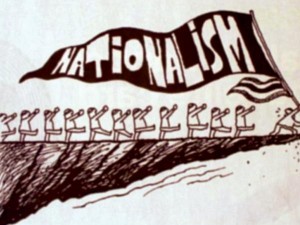International Anthem
Americans Are Less Nationalistic than Flag-Waving Politicians Think
by Lawrence Wittner
Are American politicians out of sync with the public when it comes to foreign policy? There is considerable reason to believe so.
 Throughout the scramble for the GOP presidential nomination, the major candidates have certainly been rabidly nationalistic. In a major foreign policy address on October 7, 2011, Mitt Romney proclaimed that “the twenty-first century can and must be an American Century.â€Â Championing a vast military buildup, he argued that, to secure this “American Century,†the United States should have “the strongest military in the world.â€Â By contrast, he assailed the “shameful†role of the United Nations and other international institutions and declared that he did not see any reason to obey them — or the international law they represented — when it did not suit the U.S. government.
Throughout the scramble for the GOP presidential nomination, the major candidates have certainly been rabidly nationalistic. In a major foreign policy address on October 7, 2011, Mitt Romney proclaimed that “the twenty-first century can and must be an American Century.â€Â Championing a vast military buildup, he argued that, to secure this “American Century,†the United States should have “the strongest military in the world.â€Â By contrast, he assailed the “shameful†role of the United Nations and other international institutions and declared that he did not see any reason to obey them — or the international law they represented — when it did not suit the U.S. government.
Romney’s once-anointed top competitor, Rick Santorum, says nothing about the United Nations, international cooperation, or international law in the “10 Steps to Promote Our Interests Around the World†posted on his campaign website. Instead, he argues that the United States is “intrinsically better prepared to lead than any other nation.â€Â He adds: “I truly do believe that we are ‘the last best hope of earth,’†but, alas, under President Obama, “we have been weak where we should have been strong and we have been appeasing of evil.â€Â Naturally, then, Americans should be “increasing our military preparedness.â€
By contrast, polls show that most Americans favor a more cooperative world order based on international law, a stronger United Nations, and a less dominant role for the United States in world affairs.
In a World Public Opinion poll of sixteen nations in 2009, 69 percent of Americans supported the view that nations are obliged to abide by international law even when doing so is at odds with their national interest. Furthermore, a 2010 poll by the Chicago Council on Global Affairs found 82 percent of Americans favored ratification of the Comprehensive Test Ban Treaty (rejected by the GOP-dominated Senate in 1999), 70 percent favored participation in the International Criminal Court (rejected by President George W. Bush), and 67 percent backed a new international treaty to combat climate change. In December 2008, a World Public Opinion poll found that 77 percent of Americans backed an international treaty abolishing nuclear weapons.
Furthermore, most Americans favor expanding the role of the United Nations in world affairs. Polling in 2010 by the Chicago Council on Global Affairs found that majorities of Americans favored creating a standing UN peacekeeping force (64 percent), giving the United Nations the authority to enter countries to investigate human rights violations (72 percent), creating an international marshals service with the power to arrest leaders responsible for genocide (73 percent), and empowering the United Nations to regulate the international arms trade (55 percent).
Overall, as public opinion studies show, Americans want a smaller — rather than a larger — global footprint for their nation.  According to a 2010 poll by the Chicago Council on Global Affairs, only 8 percent favored the United States playing the role of the preeminent world leader, while 71 percent favored a cooperative approach. Gallup polls have turned up similar results. In 2011, Gallup reported that only 16 percent of Americans endorsed the option of the United States playing “the leading role†in world affairs. According to Gallup, 32 percent of Americans favored “a minor role†or “no role†at all for the United States, while 50 percent wanted the United States to “take a major role, but not the leading one.â€
Much of this opposition to U.S. dominance in the world is undoubtedly based on distaste for the overseas U.S. military intervention of the past decade. In recent years, polls have found substantial public opposition to the U.S. wars in Iraq and Afghanistan. In 2010, a poll by the Chicago Council on Global Affairs found that 79 percent of Americans agreed with the statement that “the U.S. is playing the role of world policeman more than it should.â€
Of course, during the frenzy of an election campaign, it is tempting to whip up nationalist sentiment through high-flying rhetoric about an “American Century†and America’s allegedly unique virtue. How many times have we heard, in these circumstances, that America is the greatest nation in the history of the world? But, in the end, Americans might prove more committed to an internationalist policy than this year’s flag-waving politicians think.
Lawrence Wittner is Emeritus Professor of History at the State University of New York/Albany. His latest book is Confronting the Bomb: A Short History of the World Nuclear Disarmament Movement (Stanford University Press). This article was distributed by PeaceVoice.

George III of the UK was convinced that ‘might is right’, and that the British citizens of the American colonies must be made to do as they are told by their King.
1The citizens of the USA taught him the lesson that rulers are accountable to citizens and laws must protect the rights of all citizens.
The rulers of the USA must be taught the lesson again by their citizens!